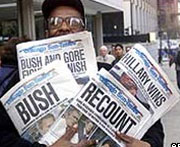|
 |
|
Investors are nervous about a repeat of 2000's disputed election
(Agencies) |
Leading US shares finished in negative territory
on Tuesday as what looked set to be one of the tightest presidential
elections ever took place.
The Dow Jones share index settled 0.19% lower at 10,036, after
surrendering earlier strong gains.
The dip reflected fears that the poll result would
be ambiguous , paving
the way for a repeat of the legal wrangling that marred the 2000 election.
Analysts say shares would come under pressure if there were no clear
winner.
"A lot of investors are sitting on
their hands waiting for [the] election to take place, and hoping that we
can get a resolution on Wednesday or Thursday," Sam Stovall,
chief market strategist at Standard & Poor's said.
The Dow lost 5% of its value in the three weeks immediately after the
2000 election, when it was unclear who would occupy the White House.
Disputes over whether either candidate had won a majority of the votes
cast in Florida meant that the outcome of that election was eventually
decided in the courts.
Successive polls in the run-up to Tuesday's
election showed President George W Bush and Democrat challenger John Kerry
running neck and neck
.
US television stations will begin conducting the first exit polls after
0000 GMT, when voting booths will begin to close.
Elsewhere on the financial markets, the dollar was up against the euro
and little changed against the yen, while the Nasdaq index of technology
stocks closed up 0.25% at 1,985.
US crude oil prices fell 51 cents to $49.62 a barrel on news that
production in the Gulf of Mexico was recovering from widespread hurricane
damage in September.
Economic issues are expected to play a key role in influencing the
outcome of Tuesday's election.
In key swing states such as Ohio and Michigan, which have seen
substantial job losses in the past four years, voters' views on the state
of the economy may prove to be the deciding factor.
Senator Kerry has attacked President Bush's economic record, hammering
home the fact that a net 800,000 jobs have been lost since he took office.
President Bush has focused on the fact that two million jobs have been
created in the past year, claiming that it has vindicated his tax-cutting
agenda.
As for future policies, both candidates have pledged to bring America's
$422bn federal budget deficit under control.
Senator Kerry is planning to increase taxes on those earning more than
$200,000 a year.
President Bush has placed reform of the pensions system at the heart of
his economic agenda for a second term.
However, economists have said both candidates' economic programmes rest
on questionable assumptions about future growth.
(Agencies) | 